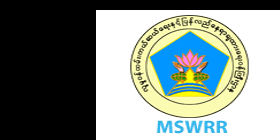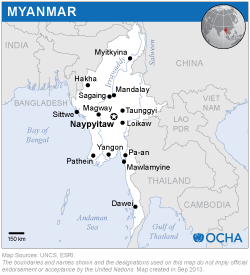This activity was follow-up of the technical advisory mission conducted in March 2012 with the aim to improve the utilization of space-based and geospatial information in all stages of disaster management. In November 2012, UN-SPIDER visited Myanmar again for dissemination of the report of the technical advisory mission and offered the training on “Geo-informatics for Disaster Risk Management” in collaboration with the International Centre for Integrated Mountain Development (ICIMOD). As a follow up, UN-SPIDER revisited Myanmar from 27 June to 1 July 2016 to take account of the progress since 2012 in using space-based information in disaster management.
The follow up activity in 2016 included three important events:
(a) High-level advocacy meeting of stakeholders: The meeting was led by the Union Minister to address important issues at policy and coordination level to act on the recommendations of technical advisory mission and support implementation of Sendai Framework;
(b) Technical consultation meeting with stakeholders of Relief and Resettlement Department of the Ministry of Social Welfare, Relief and Resettlement; and
(c) Training on “Earth Observation Technologies for Landslide Hazard and Risk Assessment” was conducted in the Emergency Operation Centre of the Relief and Resettlement Department in collaboration with ICIMOD.
As a result of engagement of UN-SPIDER in Myanmar and based on recommendation of the technical advisory mission, the Ministry of Social Welfare, Relief and Rehabilitation established the Emergency Operation Centre which hosts a section dedicated to the use of Earth observation data, and a Satellite Imagery and Research Section. An official trained through UN-SPIDER is leading the activities related to use of satellite images and mapping. UN-SPIDER is continuing its engagement with the Ministry in updating its Action Plan for Disaster Risk Reduction and support through training the Disaster Management Training Centre (DMTC). This support is offered in collaboration with the country offices of the United Nations Human Settlements Programme (UN-HABITAT) and the United Nations Development Programme (UNDP).


